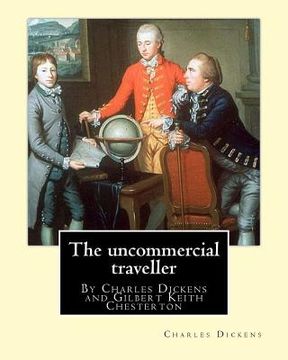The uncommercial traveller, By Charles Dickens, introduction By G. K.Chesterton: By Charles Dickens and Gilbert Keith Chesterton (en Inglés)
Reseña del libro "The uncommercial traveller, By Charles Dickens, introduction By G. K.Chesterton: By Charles Dickens and Gilbert Keith Chesterton (en Inglés)"
The Uncommercial Traveller is a collection of literary sketches and reminiscences written by Charles Dickens.In 1859 Dickens founded a new journal called All the Year Round and the Uncommercial Traveller articles would be among his main contributions. He seems to have chosen the title and persona of the Uncommercial Traveller as a result of a speech he gave on 22 December 1859 to the Commercial Travellers' School London in his role as honorary chairman and treasurer. The persona sits well with a writer who liked to travel, not only as a tourist, but also to research and report what he found; visiting Europe, America and giving book readings throughout Britain. He does not seem content to rest late in his career when he had attained wealth and comfort and continued travelling locally, walking the streets of London in the mould of the flâneur, a 'gentleman stroller of city streets'. He often suffered from insomnia and his night-time wanderings gave him an insight into some of the hidden aspects of Victorian London, details of which he also incorporated into his novels.he role of the explorer and investigator of interesting things was explained by Dickens in the introduction to the work: Allow me to introduce myself-first negatively. No landlord is my friend and brother, no chambermaid loves me, no waiter worships me, no boots admires and envies me. No round of beef or tongue or ham is expressly cooked for me, no pigeon-pie is especially made for me, no hotel-advertisement is personally addressed to me, no hotel-room tapestried with great-coats and railway wrappers is set apart for me, no house of public entertainment in the United Kingdom greatly cares for my opinion of its brandy or sherry. When I go upon my journeys, I am not usually rated at a low figure in the bill; when I come home from my journeys, I never get any commission. I know nothing about prices, and should have no idea, if I were put to it, how to wheedle a man into ordering something he doesn't want. As a town traveller, I am never to be seen driving a vehicle externally like a young and volatile pianoforte van, and internally like an oven in which a number of flat boxes are baking in layers. As a country traveller, I am rarely to be found in a gig, and am never to be encountered by a pleasure train, waiting on the platform of a branch station, quite a Druid in the midst of a light Stonehenge of samples. And yet-proceeding now, to introduce myself positively-I am both a town traveller and a country traveller, and am always on the road. Figuratively speaking, I travel for the great house of Human Interest Brothers, and have rather a large connection in the fancy goods way. Literally speaking, I am always wandering here and there from my rooms in Covent-garden, London-now about the city streets: now, about the country by-roads-seeing many little things, and some great things, which, because they interest me, I think may interest others. These are my chief credentials as the Uncommercial Traveller. Dickens began by writing seventeen episodes, which were printed in All the Year Round between 28 January and 13 October 1860 and these were published in a single edition in 1861. He sporadically produced eleven more articles between 1863-65 and an expanded edition of the work was printed in 1866. Once more he returned to the persona with some more sketches written 1868-69 and a complete set of these articles was published posthumously in 1875. Gilbert Keith Chesterton, KC*SG (29 May 1874 - 14 June 1936), better known as G. K. Chesterton, was an English writer, [2] poet, philosopher, dramatist, journalist, orator, lay theologian, biographer, and literary and art critic.
Charles Dickens (1812-1870) nació en Portsmouth y era el primogénito varón de un funcionario de la Armada Real. A los doce años, el encarcelamiento de su padre por deudas lo obligó a ponerse a trabajar en una fábrica de betún. Su educación fue irregular: aprendió por su cuenta taquigrafía, trabajó como ayudante en el bufete de un abogado y finalmente fue corresponsal parlamentario del Morning Chronicle. Sus artículos, luego recogidos en Escenas de la vida de Londres por «Boz» (1836-1837), tuvieron gran éxito y, con la aparición en 1837 de Los papeles póstumos del Club Pickwick, Dickens se convirtió en un auténtico fenómeno editorial. Novelas como Oliver Twist (1837-1839), Nicholas Nickleby (1838-1839) o Barnaby Rudge (1841) alcanzaron enorme popularidad, así como algunas crónicas de viajes, como Estampas de Italia (1846). Con Dombey e hijo (1846-1848) inició su época de madurez, de la que son buenos ejemplos David Copperfield (1849-1850), su primera novela en primera persona y su favorita, en la que desarrolló algunos episodios autobiográficos; La Casa lúgubre (1852-1853); La pequeña Dorrit (1855-1857), Historia de dos ciudades (1859), Grandes esperanzas (1860-1861) y Nuestro amigo común (1864-1865). Murió en Gad's Hill, su casa de campo en Higham, en el condado de Kent.
Ver más
Ver menos

